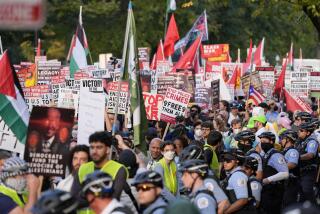1988 Democratic National Convention : Police Bar 2 Klan-Style Rallies
- Share via
ATLANTA — In a controversial step to avoid a possible clash between white supremacists and counterdemonstrators, Atlanta police canceled a permit for two rallies and a parade Sunday by the Mississippi-based Nationalist Movement on the eve of the Democratic National Convention.
The Nationalist Movement, a Ku Klux Klan-style organization, had planned an afternoon rally on the grounds of the Georgia Statehouse that was to have been followed by a march through downtown Atlanta and then another rally across the street from the site of the convention at the city’s official “free speech area.”
But a racially mixed, largely youthful group of about 1,000 counterdemonstrators showed up at the Statehouse an hour before the white supremacist rally was to begin and started chanting anti-klan slogans such as “Cops and klan, have you heard, this is not Johannesburg.” One woman held up a homemade sign that said: “Real Men Don’t Wear Bed Sheets.”
Burned Confederate Flag
In an act reminiscent of the 1960s anti-war protests, some of the counterdemonstrators burned a Confederate flag. Others wanted to burn an American flag, but they were prevented from doing so by a white man and a black man who joined together to protect the national ensign.
Atlanta Public Safety Commissioner George Napper, referring to the anti-klan demonstrators, said: “This was a hostile, angry, nasty crowd. I don’t feel guilty. It was a decision I had to make and I made it.” He added that he was determined to avoid “blood in the streets of Atlanta.”
Both white supremacists and civil libertarians decried the move, contending that it was a violation of constitutionally guaranteed rights to free speech and assembly.
“My permit is the Constitution of the United States and I don’t know that the Constitution of the United States has been revoked,” said Richard Barrett, 43, a Jackson, Miss., attorney and leader of the Nationalist Movement.
Gene Guerrero, Georgia state director of the American Civil Liberties Union, called the police decision a “shameful act on the part of the city” and accused law enforcement authorities of overreacting to the potential for danger.
Civil Rights Movement
“Most of the leaders of this city were in the civil rights movement in the South, and they should remember when they were often denied permits to march on the grounds of public safety,” Guerrero said.
But one of the counterdemonstrators, James Herlow, 36, of Atlanta, said: “It’s not a question of free speech. They lynch and castrate people. They are a terrorist organization that exists to terrorize people of color, blacks, lesbians.”
Herlow and other counterdemonstrators looked on the cancellation of the events as a victory for their side. “This is a beautiful day for me,” said Carrie Morris, president of the All-Peoples Congress, the Atlanta group that sponsored the counterdemonstration. “I’m over 50 years old and I remember when they were hanging people from the tallest tree and nothing was done about it.”
In Atlanta, the city that prides itself on its racial harmony and styles itself “the city too busy to hate,” a bloody clash between white supremacists and anti-klan activists was something that local officials feared and wanted to avoid at all costs.
Barrett received news of the police decision as he stood on the Statehouse grounds awaiting a group of approximately 150 white supremacists who were assembling about a mile away at the Atlanta-Fulton County sports stadium.
Speech Permitted
Barrett, nevertheless, was permitted to deliver his speech to a crowd of reporters before being escorted out of the city in his black pickup truck by police.
“You may have the streets now, demonstrators with your feet in the ‘60s, but we’re going to have the streets tomorrow,” he said.
More to Read
Sign up for Essential California
The most important California stories and recommendations in your inbox every morning.
You may occasionally receive promotional content from the Los Angeles Times.










